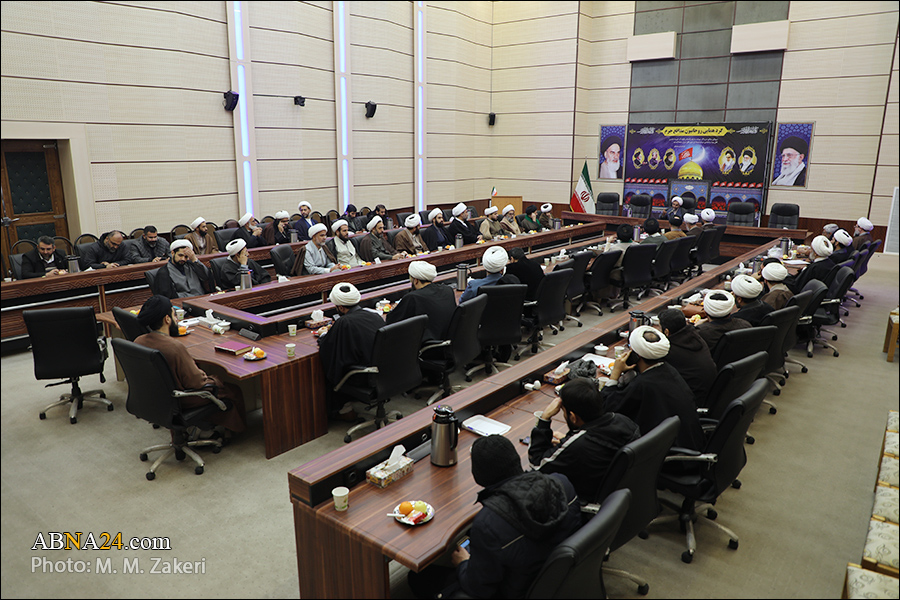How Did the Syrian Government Collapse in 11 Days? / Analysis of the Country’s Future
Referring to his analysis of Bashar al-Assad’s government’s collapse, the Cultural Advisor of the Islamic Republic of Iran in Syria stated, “The tactics of armed groups were surprising this time. They utilized media power and new methods, which were not their own and clearly indicated external training. The approach of these armed groups was different from their previous methods.”
According to the official information website of the AhlulBayt (a) World Assembly - A gathering of clerics defending the holy shrines was held on Wednesday, December 25, 2024, in the conference hall of the AhlulBayt (a.s.) World Assembly in Qom.
Reasons for the Assad Government’s Collapse
Hamidreza Mokhtas Abadi, the Cultural Advisor of the Islamic Republic of Iran in Syria, referred to the history of relations between Iran and Syria during the gathering and stated, “As the Iranian nation, we must appreciate the support provided by Hafez al-Assad’s government during the Sacred Defense (8-year imposed Iraq-Ira war) and also the assistance Bashar al-Assad’s government offered to the Resistance Axis.”
He continued, “On the surface, we should have performed better in this phase than in 2011. In 2011, the Resistance Front did not exist, and it was after that year that various groups within the Resistance were formed. Therefore, it seemed that we should have acted more strongly than before. In 2011, there was a global consensus against Bashar al-Assad’s government. However, during this phase, such a consensus did not exist, and several states supported Assad’s government.”
The Iranian Cultural Advisor added, “Additionally, in 2011, Russia was not present in Syria. However, during this phase, Russian military aircraft were stationed in Syria, and from the very beginning of the recent war, they bombed the armed groups. Furthermore, before the latest offensive by Hay’at Tahrir al-Sham against the Syrian army, no demonstrations had occurred in Syrian cities. Yet, despite these strengths, Bashar al-Assad’s government collapsed between November 28 and December 9 in just 11 days. Perhaps these strengths led to negligence.”
Analyzing the developments in Syria, Mokhtas Abadi stated, “The tactics of the armed groups were surprising this time. They utilized media power and new strategies, which clearly showed they had been trained by external forces. The approach of these armed groups was different from their previous methods. It was expected that the army, Ba’athists, and Alawites would defend Bashar al-Assad’s government, but no significant resistance was observed anywhere. The behavior of the Syrian army during the recent events was incomprehensible, even to its retired generals, who attributed it to political deals. This occurred despite Russia’s serious support for the Syrian army, with President Putin sending one of his prominent military commanders to Syria for this mission.”
“A soldier needs adequate financial support to defend. However, the economic and living conditions in Syria have deteriorated drastically. For instance, the salary of a director-general in Syria was less than $100. When the dignity of an army is trampled, what remains of it? If material factors are lacking for a soldier, spiritual motivation, such as faith in God and fearlessness of death – traits seen in Hezbollah fighters in Lebanon and Ansarullah in Yemen – becomes necessary. These qualities were absent in Syria’s Ba’ath Party, which could not inspire the Syrian army to defend the country. The younger generation in Syria did not incline the Ba’ath Party. The aforementioned factors, combined with the armed groups’ promises to Syrian military personnel that they would not harm them, eliminated the motivation of Syrian soldiers to defend their country. Furthermore, Assad’s government did not formally request Iran’s intervention to counter the armed groups’ advances,” he continued.
Predicting Syria’s Future
The Cultural Advisor of the Islamic Republic of Iran in Syria, added, “The armed groups that have taken control in Syria are likely to face serious internal conflicts. Currently, clashes between the Kurds and Hay’at Tahrir al-Sham are ongoing in Syria. Therefore, forming an authentic resistance movement in Syria cannot be ruled out. The energy crisis, especially the shortages of electricity and fuel, is a significant issue in Syria. Reconstructing the war-torn regions will require substantial funds, and any country investing in this reconstruction will undoubtedly expect financial returns and profits. Hence, it is unlikely that the new Syrian government will be able to improve the people’s livelihoods, and protests may arise over this issue. For this reason, I believe the new Syrian government faces significant challenges ahead.”
He further noted, “Working within the Ba’ath government in Syria was challenging due to its sensitivity towards any action. The previous Syrian government undermined the effectiveness of popular national defense forces by integrating them into the army, creating a state-society divide during that period. Even Ba’athists criticized the government.”
In another part of the session, Hojat al-Islam Valiollah Khademi, emphasized the necessity of vigilance against enemy plots, stating, “The enemy is not asleep, and the Supreme Leader has warned about the negligence. Clerics who stood beside fighters in defending the holy shrines must now engage in the Jihad of Explanation. We, as clerics defending the shrines, must preserve our identity in both the real world and the virtual space.”
He concluded, “The Supreme Leader stressed that some seek to please the people, and thus every gathering should end with hope and enthusiasm for divine victory. We must avoid aiding the enemy’s agenda and remain vigilant and loyal to the Supreme Leader.”
Referring to his analysis of Bashar al-Assad’s government’s collapse, the Cultural Advisor of the Islamic Republic of Iran in Syria stated, “The tactics of armed groups were surprising this time. They utilized media power and new methods, which were not their own and clearly indicated external training. The approach of these armed groups was different from their previous methods.”
According to the official information website of the AhlulBayt (a) World Assembly - A gathering of clerics defending the holy shrines was held on Wednesday, December 25, 2024, in the conference hall of the AhlulBayt (a.s.) World Assembly in Qom.
Reasons for the Assad Government’s Collapse
Hamidreza Mokhtas Abadi, the Cultural Advisor of the Islamic Republic of Iran in Syria, referred to the history of relations between Iran and Syria during the gathering and stated, “As the Iranian nation, we must appreciate the support provided by Hafez al-Assad’s government during the Sacred Defense (8-year imposed Iraq-Ira war) and also the assistance Bashar al-Assad’s government offered to the Resistance Axis.”
He continued, “On the surface, we should have performed better in this phase than in 2011. In 2011, the Resistance Front did not exist, and it was after that year that various groups within the Resistance were formed. Therefore, it seemed that we should have acted more strongly than before. In 2011, there was a global consensus against Bashar al-Assad’s government. However, during this phase, such a consensus did not exist, and several states supported Assad’s government.”
The Iranian Cultural Advisor added, “Additionally, in 2011, Russia was not present in Syria. However, during this phase, Russian military aircraft were stationed in Syria, and from the very beginning of the recent war, they bombed the armed groups. Furthermore, before the latest offensive by Hay’at Tahrir al-Sham against the Syrian army, no demonstrations had occurred in Syrian cities. Yet, despite these strengths, Bashar al-Assad’s government collapsed between November 28 and December 9 in just 11 days. Perhaps these strengths led to negligence.”
Analyzing the developments in Syria, Mokhtas Abadi stated, “The tactics of the armed groups were surprising this time. They utilized media power and new strategies, which clearly showed they had been trained by external forces. The approach of these armed groups was different from their previous methods. It was expected that the army, Ba’athists, and Alawites would defend Bashar al-Assad’s government, but no significant resistance was observed anywhere. The behavior of the Syrian army during the recent events was incomprehensible, even to its retired generals, who attributed it to political deals. This occurred despite Russia’s serious support for the Syrian army, with President Putin sending one of his prominent military commanders to Syria for this mission.”
“A soldier needs adequate financial support to defend. However, the economic and living conditions in Syria have deteriorated drastically. For instance, the salary of a director-general in Syria was less than $100. When the dignity of an army is trampled, what remains of it? If material factors are lacking for a soldier, spiritual motivation, such as faith in God and fearlessness of death – traits seen in Hezbollah fighters in Lebanon and Ansarullah in Yemen – becomes necessary. These qualities were absent in Syria’s Ba’ath Party, which could not inspire the Syrian army to defend the country. The younger generation in Syria did not incline the Ba’ath Party. The aforementioned factors, combined with the armed groups’ promises to Syrian military personnel that they would not harm them, eliminated the motivation of Syrian soldiers to defend their country. Furthermore, Assad’s government did not formally request Iran’s intervention to counter the armed groups’ advances,” he continued.
Predicting Syria’s Future
The Cultural Advisor of the Islamic Republic of Iran in Syria, added, “The armed groups that have taken control in Syria are likely to face serious internal conflicts. Currently, clashes between the Kurds and Hay’at Tahrir al-Sham are ongoing in Syria. Therefore, forming an authentic resistance movement in Syria cannot be ruled out. The energy crisis, especially the shortages of electricity and fuel, is a significant issue in Syria. Reconstructing the war-torn regions will require substantial funds, and any country investing in this reconstruction will undoubtedly expect financial returns and profits. Hence, it is unlikely that the new Syrian government will be able to improve the people’s livelihoods, and protests may arise over this issue. For this reason, I believe the new Syrian government faces significant challenges ahead.”
He further noted, “Working within the Ba’ath government in Syria was challenging due to its sensitivity towards any action. The previous Syrian government undermined the effectiveness of popular national defense forces by integrating them into the army, creating a state-society divide during that period. Even Ba’athists criticized the government.”
In another part of the session, Hojat al-Islam Valiollah Khademi, emphasized the necessity of vigilance against enemy plots, stating, “The enemy is not asleep, and the Supreme Leader has warned about the negligence. Clerics who stood beside fighters in defending the holy shrines must now engage in the Jihad of Explanation. We, as clerics defending the shrines, must preserve our identity in both the real world and the virtual space.”
He concluded, “The Supreme Leader stressed that some seek to please the people, and thus every gathering should end with hope and enthusiasm for divine victory. We must avoid aiding the enemy’s agenda and remain vigilant and loyal to the Supreme Leader.”






